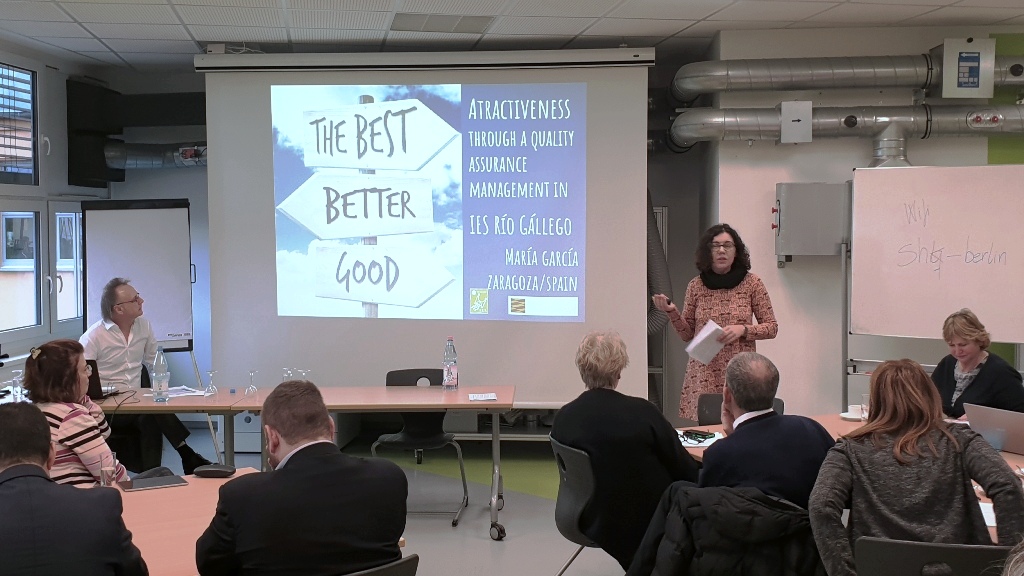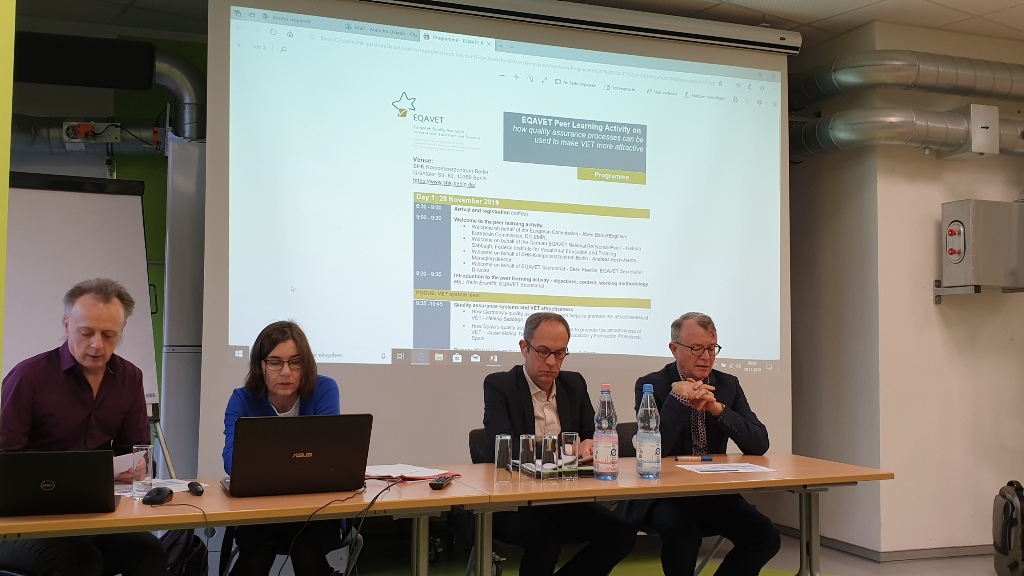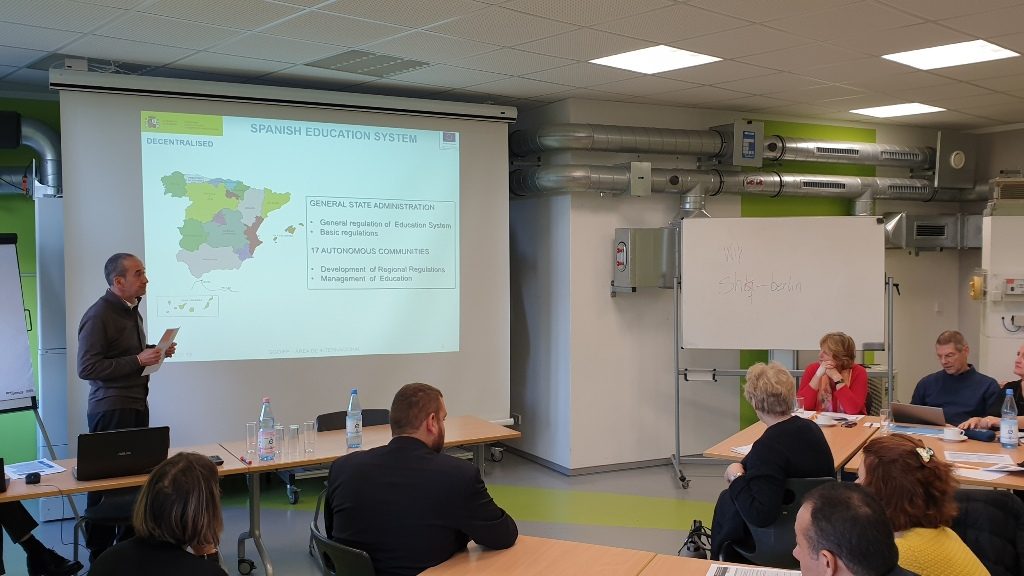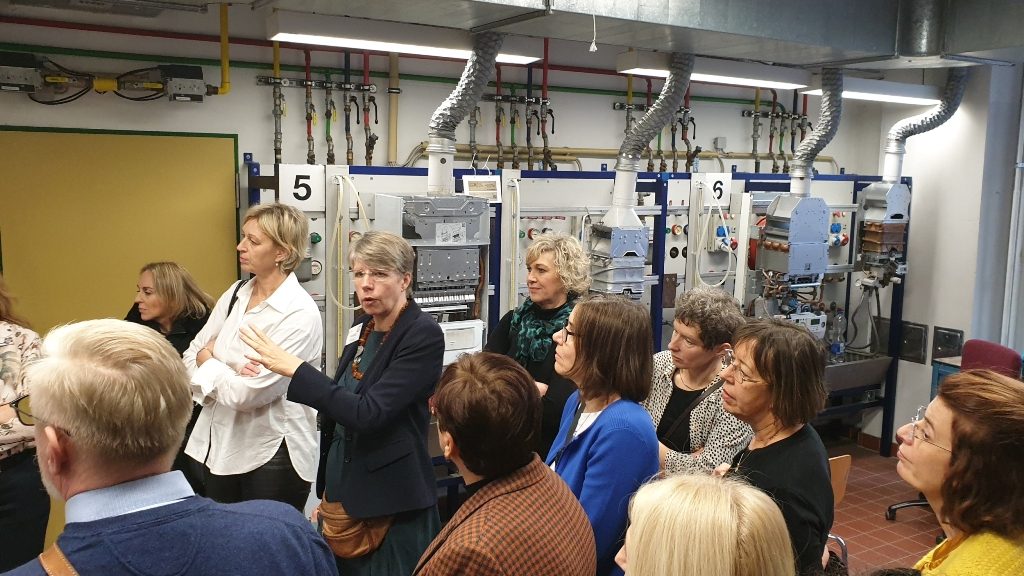
02 Dec EQAVET PLA Berlin: Quality assurance as an attraction of vocational training
A meeting of the members of the Network took place on 28 and 29 November. EQAVET (European Framework for Quality Assurance in VET), in the SHK Kompetezentrum Berlinto develop a mutual learning activity on "How quality assurance processes can make VET more attractive".
The Spanish model of quality assurance in VET was represented by F. Javier Molina (member of the EQAVET Network and advisor to the Subdirectorate General for Organisation and Innovation of the VET of the Ministry of Education and VET - Madrid), María García (Head of Studies at IES Río Gállego - Zaragoza) and José A. Navarro (Advisor to CIFPA - Zaragoza).
The event was opened with a welcome from the various members of the institutions and organizations coordinating the meeting:
- Koen Bois d'Enghien, European Commission, DG EMPL.
- Helena Sabbagh, Federal Institute for Vocational Education and Training, representing the German National Reference Centre EQAVET.
- Andreas Koch-Martin, Managing Director of SHK-Kompetenzzentrum Berlin.
- Sean Feerick, Director of the EQAVET Secretariat.

Presentations.
The papers presented during the two days of the meeting offered different approaches, at different levels and actors, on quality assurance and its influence on the attractiveness of VET.
At the level of state VET systems, the presentations were as follows:
- Quality assurance systems and attractiveness of the FP
- How Germany's quality assurance approach helps to promote the attractiveness of VET - Helena Sabbagh, Federal Institute for Vocational Education and Training, Germany.
- How Spain's quality assurance approach helps promote the attractiveness of EEP - Javier Molina Tornero, Ministry of Education and Vocational Training, Spain.

- Perspective from the trade unions:
- How the Dutch quality assurance system helps to promote the attractiveness of VET - Rini Romme, Secondary Vocational Education (MBO), The Netherlands.
- Quality management in VET providers as an attraction for students.
- Example from Germany
Peter Biniok, Research Scientist at SHK-Kompetenzzentrum Berlin
- Example from Spain
María García González, Head of Studies, I.E.S. Río Gállego, Autonomous Community of Aragón
- Example from the Netherlands
Scilla van Cuijlenborg, Secondary Vocational Education (MBO)
Peer Learning Activity
The mutual learning activity was structured by means of discussion tables, in small groups, in which to address and give answers to the following questions:
- Debates at the level of the state FP system
- Can quality assurance help improve the attractiveness of VET?
- What are the main issues to be taken into account when using quality assurance to increase attractiveness?
- What Makes VET Programs Attractive?
- Discussions at the level of VET providers (training centres and companies)
- To what extent can providers encourage students to take ETI programs?
- What are the quality assurance issues that are particularly important for EEP providers?
The conclusions of these discussions will be set out in a report to be published by EQAVET in the next few days.
Visit to SHK Kompetezentrum Berlin
The participants had the opportunity to get to know the formation centre where the meeting was being held. This is a competence training centre for the building installation professionals' guild (sanitary, heating, air conditioning and auxiliary systems) funded by the Federal Ministry of Economic Affairs and Energy and the Senate Administration for Integration, Labour and Social Affairs. The center was recently transformed into a Center of Excellence for Energy Efficiency Technology in Construction.
More than 4,000 participants in training courses pass through this centre each year and more than 1100 apprenticeships are supervised each year. In addition, around 350 vocational training examinations are conducted for new officers in the SHK (Sanitary, Heating and Air Conditioning) sector in Berlin.

Acknowledgements.
From CIFPA we would like to express our sincere gratitude to F. Javier Molina for having the Vocational Training of Aragon as a national exponent of Quality in Vocational Training and to María García for her presentation and highlighting the day-to-day value of the quality management system of the Rio Gállego Secondary School in Zaragoza.
Berlin 28 and 29 November 2019

